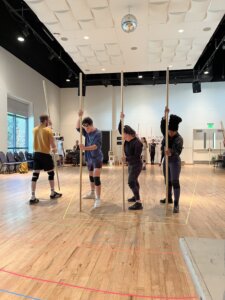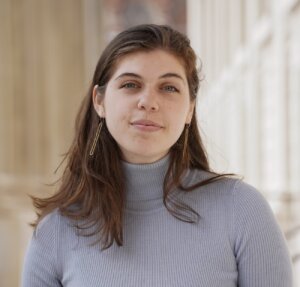It’s a giant musical about Jesus – with a Jewish producer. Will it make America believe?
‘His Story,’ by 22-year-old Anna Miriam Brown, is a ‘Broadway-style’ theatrical spectacle. Whether it’s also an evangelizing event depends on whom you ask

Graphic by Angelie Zaslavsky
Jesus couldn’t figure out his footwork. He trudged across the rehearsal room with a cross balanced on his shoulder, muttering eight counts through gritted teeth. It was 4 p.m. in the Lewisville Grand Theater, a city-owned arts center in a Dallas suburb that had been taken over by rehearsals for His Story, a new musical about Jesus by 22-year-old Anna Miriam Brown.
Billed as a “theatrical event 2000 years in the making” and backed by a Broadway producer and a right-wing reality TV star, His Story occupies the unlikely intersection of New York’s ultra-liberal commercial theater world and the conservative evangelical establishment. It also marks the latest addition to perhaps one of the most surprising trends in musical theater: shows about Jesus.
The company, led by 23-year-old Max Kuenzer as Jesus, reset for the top of the crucifixion sequence. Ensemble members filed into military formation. They advanced toward Jesus as a pulsing hip-hop track played, carrying wooden planks to build a makeshift cross. At the song’s climax, Kuenzer leaned back until he was lying flat on the cross, gasping out his last notes. As the cast finished the song in stillness, one actor started to cry. Then another. Then two more.
Listen to That Jewish News Show, a smart and thoughtful look at the week in Jewish news from the journalists at the Forward, now available on Apple and Spotify:
It was a poignant theatrical sequence, complete with the hallmarks of any good Broadway tear-jerker. But for some of the actors, the crucifixion in His Story represented more than just a powerful dramatic moment. It was a profound religious experience.
A radical theatrical tactic
His Story sets the biblical story of Jesus to a contemporary pop and hip-hop score. Whether it’s also an evangelizing event depends on whom you ask.

Director Jeff Calhoun, a 2012 Tony nominee for his work on Newsies and a gay, liberal New Yorker, hasn’t approached it that way.
“We all agreed from the outset that first and foremost, we’re creating a piece of theater,” Calhoun said. “Whether someone takes it literally or metaphorically doesn’t matter to me.”
Producer Bruce Lazarus, who is Jewish and previously ran the theatrical publishing house Samuel French, sees the project similarly. “It’s by no means a pageant,” he said. “Our show is not corny. Our show is Broadway.”
I’d ended up in Dallas with what might have seemed a curious mission for a reporter at a Jewish publication: teasing apart the relationship between religion and art in a new musical about Jesus. Sitting in on a few days of rehearsal, I was struck by the fact that most of the time, it felt like the company could have been rehearsing any other musical. There were dancers stretching at the barre, and a buffet of tea and cough drops in the corner.
Still, the show’s religious core found its way into the rehearsal room: On breaks, some cast members gushed about theology, and the “Joke of the Day” taped next to the daily schedule was at one point a pun on the word Christ.
As I watched the actors rehearse songs about the beauty of following Jesus, I wondered how much of their reverence was real.
Brown, the oldest of 15 children in an evangelical family, started writing His Story to open people up to the Bible. (Brown was raised as a Christian, but most of her father’s side of the family is Jewish; her father himself was raised Catholic, before starting to attend Calvary Chapel services at 13.)
Her adaptation of the New Testament humanizes the show’s religious figures, making them accessible for a 21st century audience. Lucifer is a pop diva, and Mother Mary sounds like Taylor Swift. The show’s diverse, primarily Gen Z cast portrays Jesus and his disciples as empathetic characters who just so happen to have started the world’s largest religion.
It’s a radical theatrical tactic, and Brown isn’t the first to apply it to Jesus.

Andrew Lloyd Webber’s Jesus Christ Superstar opened on Broadway in 1971, the same year that Godspell, with music and lyrics by the Jewish writer Stephen Schwartz, premiered at the LaMama Experimental Theatre Club. Both musicals went on to achieve incredible success, entering the zeitgeist by way of earworm songs, film adaptations and over 50 years of countless community theater productions.
Godspell wasn’t originally Schwartz’s idea. He was just the 21-year-old composer called in to rewrite the score. “Being a Jewish boy from Long Island, I didn’t really know these stories,” he told his biographer in a 2018 interview. His lack of familiarity with the New Testament gave him the critical distance he needed to make the Bible work as a piece of theater.
Before Jesus came to Broadway, keeping overt religion out of musicals had been an unspoken rule of producing. Musical theater pioneers Richard Rodgers and Oscar Hammerstein II, who were both Jewish, secularized religious source material to appeal to a broad commercial audience: In Carousel, for instance, the ballad “You’ll Never Walk Alone” emerged from a scene in which a character reads from the Gospel of Matthew. But in the song, Hammerstein’s lyrics invoke hope and faith without ever delving into Christianity.
“When one deals with the Bible for storytelling purposes, it’s not really about religion,” Schwartz said in a 1997 interview, discussing two of his post-Godspell biblical ventures: the 1991 musical Children of Eden, based on the Book of Genesis, and the beloved animated Exodus story The Prince of Egypt. “It’s really about telling human stories.”
And His Story isn’t the only new musical about Jesus to emerge in recent years.
Bekah Brunstetter and Cinco Paul’s A.D. 16, which played at Maryland’s Olney Theatre Center in 2022, imagines Mary Magdalene as a teenager “crushing hard on a Jewish carpenter’s son.” Neil Berg and Robert Schenkkan’s The 12, which follows the disciples after the loss of Jesus, will run at Goodspeed Opera House this September, after premiering in Denver in 2015.
Outside of musical theater, The Chosen, a television drama about Jesus, just released its third season — yet more evidence that 2,000 years out from the crucifixion, Jesus is at the forefront of popular culture.
But His Story‘s relationship to religion sets it apart from other musicals. The show’s canonical predecessors use Jesus as a theatrical metaphor: Jesus Christ Superstar is about fame and celebrity-worship; Godspell follows a band of hippies who build a community. None of them overtly proclaim Jesus’ divinity. While Brown’s musical has similar themes of kindness, love and redemption, it’s fundamentally a musical about the dawn of Christian faith.
‘Something miraculous happened’
Brown was 16 when she started writing His Story. She’d felt that her faith was deepening, so she followed a friend on a medical mission trip to Kenya.

There, she was introduced to Hamilton.
One day, while cooling off from the heat, Brown listened to the entire cast recording in one sitting. By the time she finished, she was, to her amazement, crying about the founding fathers. “Suddenly, all of that was so personal to me,” Brown said. “I was like, ‘Oh my goodness. What if someone could do this to open people’s eyes to Jesus?’”
Brown had never been interested in theater and had never studied music, let alone tried to compose anything. But when she returned home, she asked her sister Rachel to teach her four chords on the piano.
“I kind of just prayed, and I felt like something miraculous happened,” Brown said. “I had a gift with figuring out chords and music, and it came in such a supernatural way.”
In less than a year, she’d written 30 songs. When her parents saw a video of her singing one of them on Facebook, they resolved to do anything they could to get her music out into the world. Brown recorded a concept album and posted clips from the recording session on social media. Meanwhile, her parents sent the music to anyone they knew who might be able to help.
Eventually, it reached Lazarus through a family friend.
“My first thought is, you know, a little girl writes a musical about Jesus, it’s a vanity project,” Lazarus said. But he gave it a listen. The first song he heard, he said, “was like a hip rap.” The next, an indie-pop take on the Annunciation of Mary, sounded like a radio hit.
By the third, Lazarus, who had been on the hunt for a musical about God since having a “spiritual awakening” in a 12-step program, was crying.
Lazarus thought that New York audiences and critics would be too cynical about Christianity to embrace the show’s earnest message of faith. So, he decided to open His Story in Dallas, where the greater metropolitan area is home to roughly 1.9 million people with a Christian affiliation, and eight of the 25 largest churches in America are nearby.
Despite hoping that the show will gain popularity among Christians, Lazarus, who speaks with the cadence of a Borscht Belt comedian, often brings up its universality. “I find that Christians appreciate that I’m Jewish or I’m not necessarily a Christian,” he said. “Whether you believe Jesus is the Messiah or not, he’s my human brother. He’s my Jewish brother.”
Meanwhile, his co-producer Willie Robertson — the scraggly-bearded star of Duck Dynasty — covers the appeal to evangelicals. When Robertson and his wife, Korie, promote the musical, they talk about it as an incredible way to get a new generation excited about Jesus, especially those who might not already practice Christianity. (Robertson entered the theater world in 2015, when Calhoun directed a musical adaptation of his memoir in Las Vegas.) At a performance preview, Robertson likened the show’s company to the original disciples of Jesus — except with a multimillion dollar budget, and a social media team.
Inside the Broadway Tent
Off the side of Texas State Highway 121, a 200-foot-high Ferris wheel rises into the heavens. Next to it is a massive white tent. And just off the road, an unmissable crown of thorns on a purple billboard identifies the tent complex as the home of His Story.
Doing His Story in a tent wasn’t always the plan. Lazarus had initially looked to rent a theater in Dallas, but he couldn’t find one that would lease to the production for an open-ended run. He found an abandoned church that had the right feel but decided it was a little too on the nose.
So he raised $1.5 million to buy a fully enclosed, theater-in-the-round tent from a British production company. Located on the grounds of Grandscape, a 433-acre shopping center owned by Warren Buffett, that tent was just the beginning of what has since become a giant, multi-tent complex.
When I visited the construction site during one of the final weeks of rehearsals, Lazarus led me through the lobby tent. He paused to point out a magnetometer: Since Texas is an open-carry state, he and his team have to use their legal rights as a private venue in order to ask theatergoers to leave their guns outside the performance space.

On the inside, the so-called Broadway Tent evokes revival meetings and Cirque du Soleil in equal measure. The sprawling setup is surprisingly intimate; the furthest seats in the house are, amazingly, only 13 rows from the stage. At the same time, the tent’s mammoth potential for spectacle is part of its appeal.
Thirteen laser projectors illuminate the tent’s ceiling with panoramic scenes of the desert, the night sky and the pits of hell. One ring of the circular stage is a rotating turntable, and another is a pneumatic lift that ascends for the resurrection. There’s also a staircase with a diving board that lets Jesus walk on water in the act one finale.
Lazarus led me to the back row to demonstrate that there isn’t a bad seat in the house. On our way up the stairs, Lazarus pointed out the 2,000-pound light-up crown of thorns hanging above the stage like a halo.
He called out to a stagehand, asking him to operate the crown so we could see how it flies in. Slowly, it lowered to hover above the stage, as it does in the crucifixion scene.
Lazarus leaned over to me and said, referencing the iconic falling object in Phantom of the Opera, “It’s our chandelier.”
‘It all came from Jewish roots’
Brown’s closest collaborator on His Story is her sister, Rachel. The two moved to Dallas to work on the musical, while their parents and siblings live on a farm in Indiana. Growing up, their family traveled on missions and had a daily Bible study, but their father’s Jewish heritage meant that marking Shabbat and other Jewish holidays was also a component of their religious upbringing.
“Sometimes people make Christianity this whole separate religion, but it all came from Jewish roots,” Brown told me over smoothie bowls at the Seven Mile Cafe, a breakfast spot near His Story’s rehearsal space. “That’s the true theology of the Bible. When you become a Christian, you become a Jew.”
This year, the duo had big plans to host a Seder with friends, but their rehearsal schedule got in the way. “We were so tired, so we ended up just buying pies and making pasta,” Brown said. “It wasn’t very Passover-y, but the spirit was there.”
“That’s like the opposite of Jewish Passover,” I said. “I did eight days of no bread.”
Brown’s open warmth tends to have an uncanny effect on people. Over the course of our meal, she effusively complimented my outfit, a waitress’ earrings and the barista’s mangled attempt at latte art. She ordered a green smoothie to save room for the salmon dinner to which a family she’d just met had invited her. At dinner the night before, the couple she and Rachel had been chatting with secretly picked up their tab and bought them every dessert on the menu.
For Brown, who spent her teenage years in missionary communities in Italy and Ukraine, the rehearsal room for His Story is a more secular environment than she’s used to — some cast members grew up without religion or don’t believe in God.
Still, Brown loves that people across religious backgrounds can connect over her show. “We have our beliefs, but God is the one over everything,” she said. “We really believe that He is choosing the people that He wants to be in this.”
‘Sort of like walking a tightrope’
Once the show finds its momentum, His Story is exciting to watch. Brown’s songs are catchy, and the orchestrations by Rick Hip-Flores make them sound incredibly Hamilton-esque. (Hip-Flores flies out to Dallas on his days off from playing in the orchestra of Lloyd Webber’s Bad Cinderella on Broadway). The show’s mesmerizing choreography from emerging director-choreographer Eamon Foley and its immersive projections make it all the more compelling.
Yet when dealing with the show’s relationship to Christianity, the creative team’s work was “sort of like walking a tightrope,” Calhoun said. Their goal was to develop a faithful musical about Jesus without “making it feel like it’s exclusively for a Christian market, or negating the message purely for entertainment.”
Brown, who is already at work on three more Biblical musicals — including one about Queen Esther called Little Hadassah — is already bracing herself for backlash. “Anything that has to do with Jesus is always controversial,” she said.
Lazarus hopes that His Story will become a global sensation. He hired a documentary crew to create a behind-the-scenes look at the show’s development for what he sees as its inevitable hordes of future fans. At press events, he shares his ambitions to open satellite productions of the show in other cities with large Christian populations, like Nashville, Orlando and Atlanta.
“It’s not built to run for four or five months,” he said. “It’s built to run for 20 years.”
With its religious themes and red-state location, His Story could be seen as a case for a Broadway offshoot marketed to the Christian right. Brown largely doesn’t engage in politics, so the show operates as something of a partisan Rorschach test. I went into rehearsals half-expecting to be turned off by a barrage of evangelical talking points, but the musical is just as viable as a left-wing call for Christian tolerance as it is a proselytizing text.
“I don’t think that there’s a specific ‘politics’ about it. I mean, we don’t really think about that,” Brown said. “We know what we know, and that’s the story of Jesus.”
“I want this to traverse politics,” Calhoun said. “I want to get away from CNN and Fox and MSNBC and go into a theater that’s hopeful and entertaining.”

Calhoun is about as Broadway as it gets: He often says that he has two God-given talents and one is that he can tap dance. (The second: He’s a good judge of character.) So when some people found out that he was going to Texas to direct a show about Jesus, they were baffled.
“I think there was an initial giggle at first. ‘You’re doing a show about what? About who?’” he said. “But then, if you think about it, why not?” And for Calhoun, the subject matter of His Story gave him something of the spiritual grounding he needed.
Calhoun grew up in the Lutheran church, which, as a child, he saw as a loving, supportive community. “Like a lot of young, sensitive boys, I wanted to be a minister,” he said.
“And then, of course, as I got older, I realized that there was a flipside to that.”
After his minister said that his childhood best friend, who was Jewish, wouldn’t be able to go to heaven with him, Calhoun “parted ways” with organized religion.
Working on His Story has reminded him of the values that initially drew him to that world. “It certainly opens a floodgate of reminders of compassion and being the best person I can be,” he said. “How can you tell this story and not come in and be inspired by that every day?”
Calhoun isn’t alone. For Richard Chaz Gomez, who plays Judas, revisiting Christianity as an actor has helped him heal from his past religious trauma. “As a gay man, a lot of that loneliness, a lot of that hurt, has come at the hands of the church,” he said. “I couldn’t have asked for a better opportunity to be a part of this form of church in the theater.”
While evangelical audiences have already drummed up excitement about the show, the question of its success hinges in part on whether secular audiences will embrace its spectacle, even if they don’t believe in its message. But the fact that His Story has gotten this far indicates how much the American theater industry — and America itself — has changed.
In an increasingly fractured country, in which mainstream cultural production tends to be the provenance of an urban, often liberal set of creatives, His Story offers a suggestion of what a discrete culture geared to the Christian right might look like.
The musical ends on its most overtly evangelical note. After the resurrection, Jesus reminds the crowd that he died to save them, and that “to live is to whisper my name.” He floats up into the heavens on the pneumatic lift, and the final number begins. As the show concludes, the cast sings one of Brown’s pop choruses — “His Kingdom come! Oh, His Kingdom come!” — over and over again.
As I drove away from the rehearsal room on my last day in Dallas, I found myself singing that chorus in the car. It kept popping into my mind on the way to the airport, and on my flight back to New York. The more it happened, I felt uneasy about how the lyric left me repeating a Christian doctrine I don’t believe in.
I’d seen a musical and left with a song stuck in my head, something I’d done countless times before. But with His Story, letting myself get swept up in the lingering melody wasn’t that simple. Perhaps because it wasn’t just a song — it was a prayer.
His Story opens at The Broadway Tent at Grandscape in The Colony, Texas, on May 18.

















